ChatGPT is out. Discover the top 3 specialized AI models for enterprise customer support in 2026: Anthropic Claude, Google Gemini/CCAI, and AWS Bedrock. Crucial for CTOs.

The way companies handle customer support is changing fast. By 2026, the market will shift away from general AI tools like ChatGPT. It will move towards specialized AI systems that are built for businesses, especially those that must follow strict rules for data privacy and security (like banks or hospitals). OpenAI started the AI trend, but three new ecosystems are becoming the most important for corporate customer service AI: Anthropic Claude, Google Gemini/CCAI, and AWS Bedrock/Connect.
These three are competing in three key areas:
Here is a quick look at the top contenders:
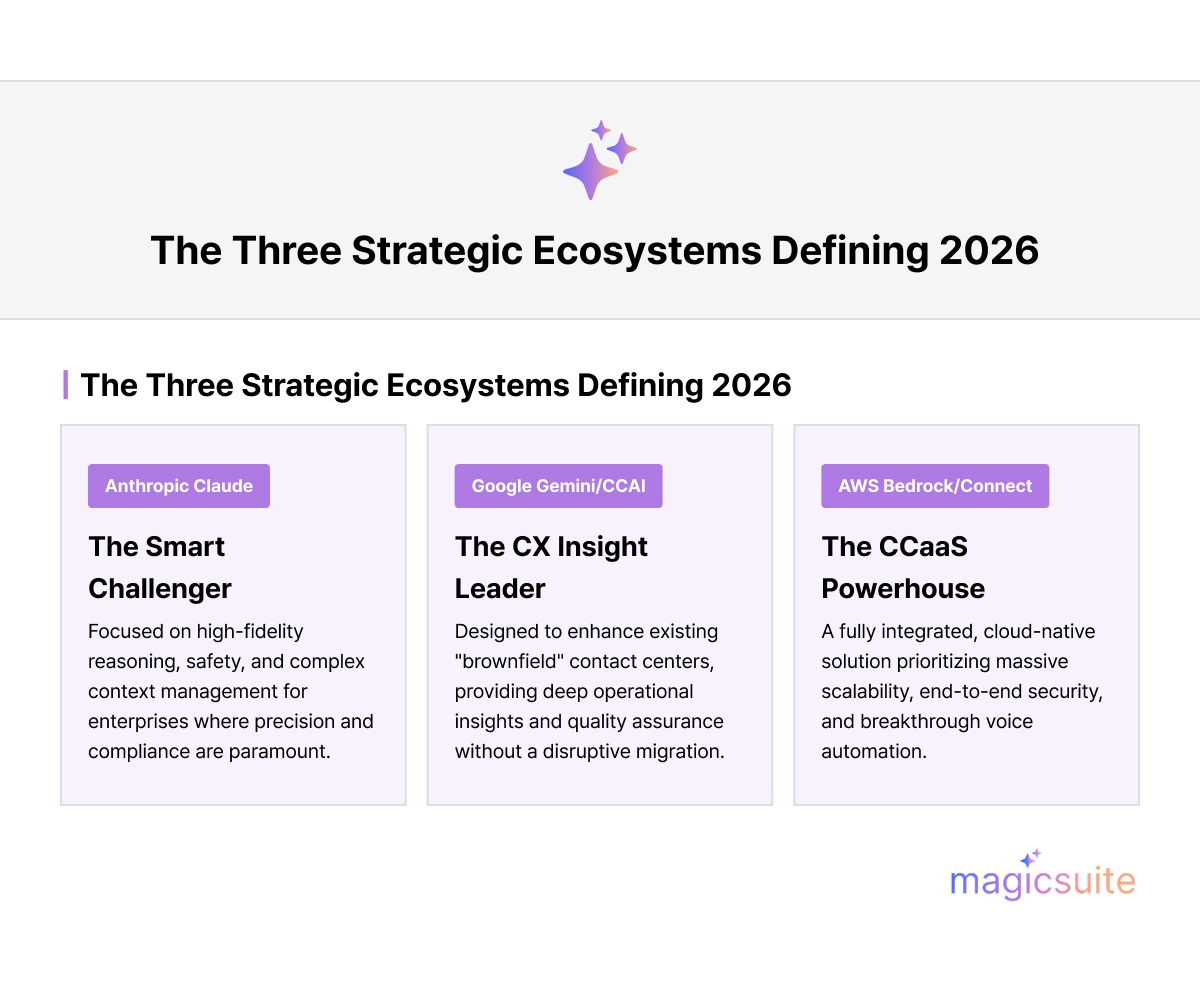
Choosing the right platform is the most important decision for Chief Technology Officers (CTOs). Success means picking the best integrated and compliant system, not just the best model.
The market is now focused on AI agents. These are advanced digital workers. They can handle complex, multi-step tasks and solve customer problems without a human helping them all the time. Gartner predicts that by 2026, 40% of all business apps will use AI agents.
Building these smart agents is hard. A McKinsey study suggests that three out of four companies that try to build complex agents on their own will fail. The main problem is managing the complexity and meeting legal rules.
Companies need systems that keep data and secrets inside their own network to meet rules like GDPR or HIPAA. This demand for private AI is high. Because of the cost and legal risk, most companies will not build their own agents. Instead, they will use ready-made, secure platforms from vendors like Anthropic, Google, and AWS. These platforms handle the safety and legal burdens for them.
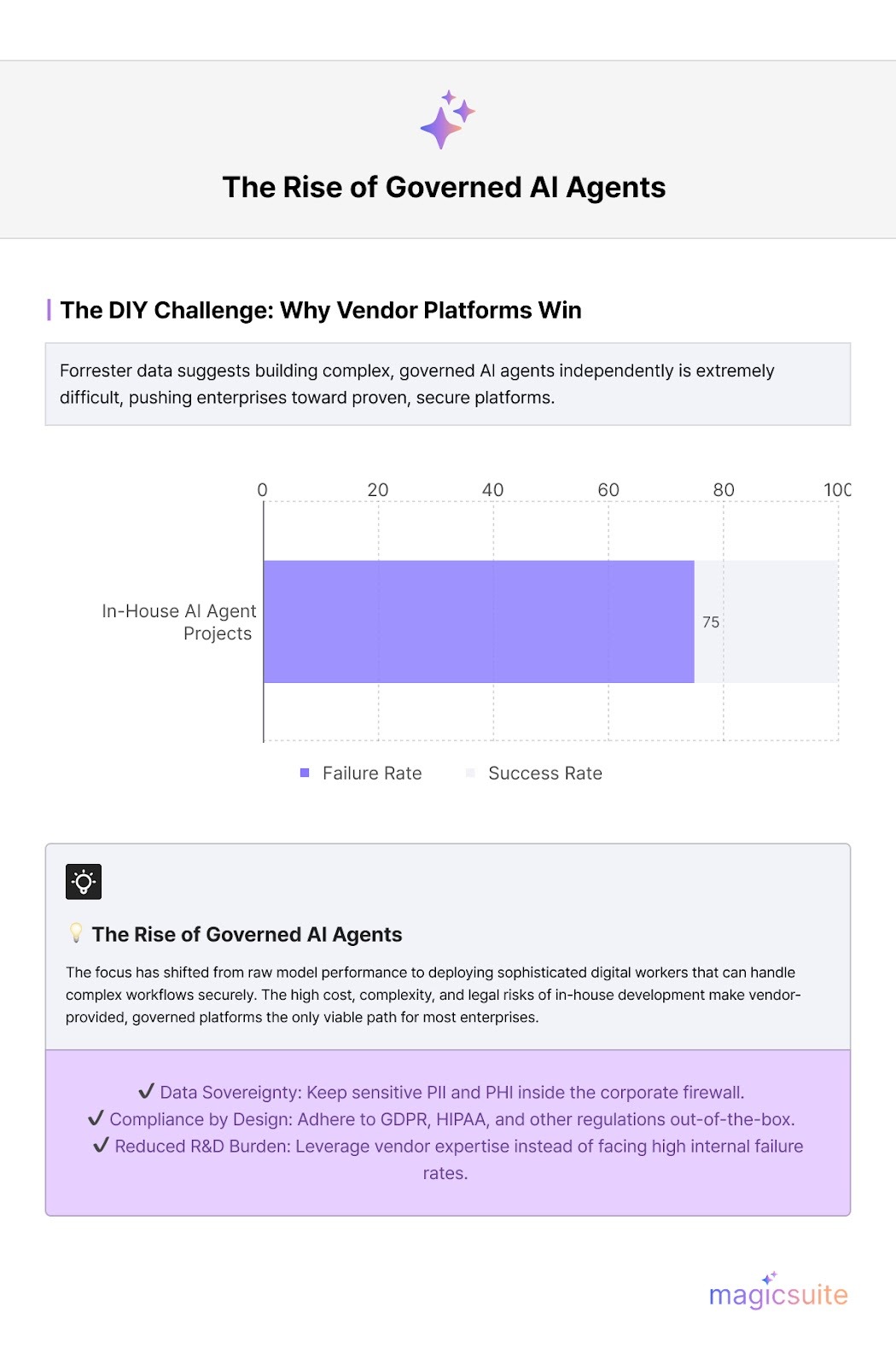
The AI market for customer service is expected to hit $19.21 billion in 2025. Why? Companies need better ways to automate support. According to Gartner, AI in call centers is expected to save companies about $80 billion in agent labor costs.
The main goal of using AI is not just to make customers a little happier. The goal is to fundamentally save costs by letting AI solve most basic and repetitive problems on its own. Companies aim for high rates of ticket deflection (AI solving issues before they reach a human). They also want to lower Average Handle Time (AHT) and stop human agents from burning out. To reach this goal, AI must do more than just answer FAQs. It must include these smart features:
Gives human agents instant help, coaching, and facts during a call. The primary example is Google Agent Assist.
The AI handles full, complex tasks without a human. Primary examples include Intercom Fin and Claude Agents.
Watch calls in real-time to check for business rules or customer frustration. The primary example is Google Conversational Insights.
The AI takes action across different business systems (like updating an order in a CRM)—Amazon Nova Sonic (Speech-to-Speech) and high compliance.
Today's best platforms must be able to do real-time mood analysis, intelligent routing, and manage work across Customer Relationship Management (CRM) and other systems.
Read more on: 7 Best Marketing Automation Tools for Startups
For companies in regulated fields like finance, health, and government, data security is key. They cannot use public AI tools that send sensitive data (like patient or personal ID information) to a third party.
This need has led to Private LLMs. These models are hosted only within the company's own secure systems. This setup keeps the data private. It lets companies train the AI on their own data while maintaining a full security record. The mandatory security features now include:

Anthropic is a major rival to OpenAI. Its focus on safety, quality, and enterprise use makes it a top choice for business. Anthropic is designed for industries that require high precision, such as finance and cybersecurity.
Claude's main edge is the quality of its underlying model. It is known for being great at multi-step reasoning and solving logic problems. Its answers also sound more natural and less robotic than competitors.
Superior Long Context Handling is a huge benefit for customer support. Claude can handle very long amounts of text. An agent can upload hundreds of sales calls, dozens of long policy documents, or long customer histories. This "long memory" is needed for hard problems. It allows the AI to look at a full, complex case history and give an accurate answer. This prevents the AI from making big mistakes that happen when it forgets details.
Claude's ability to read and follow long policy documents also acts as a regulatory guardrail. By only using approved, domain-specific texts, the system lowers the risk of giving wrong or non-compliant information.
Anthropics are flexible. Its models are available through its own API. More importantly, they are also on major cloud platforms like AWS Bedrock and Google Cloud’s Vertex AI. This multi-cloud choice helps companies avoid being locked into one vendor.
Anthropic's integration core is the Model Context Protocol (MCP). This is an open system that makes it easy to build secure AI agent workflows. It lets Claude agents safely connect with tools and systems, like updating customer records in Salesforce, without risking data leaks.
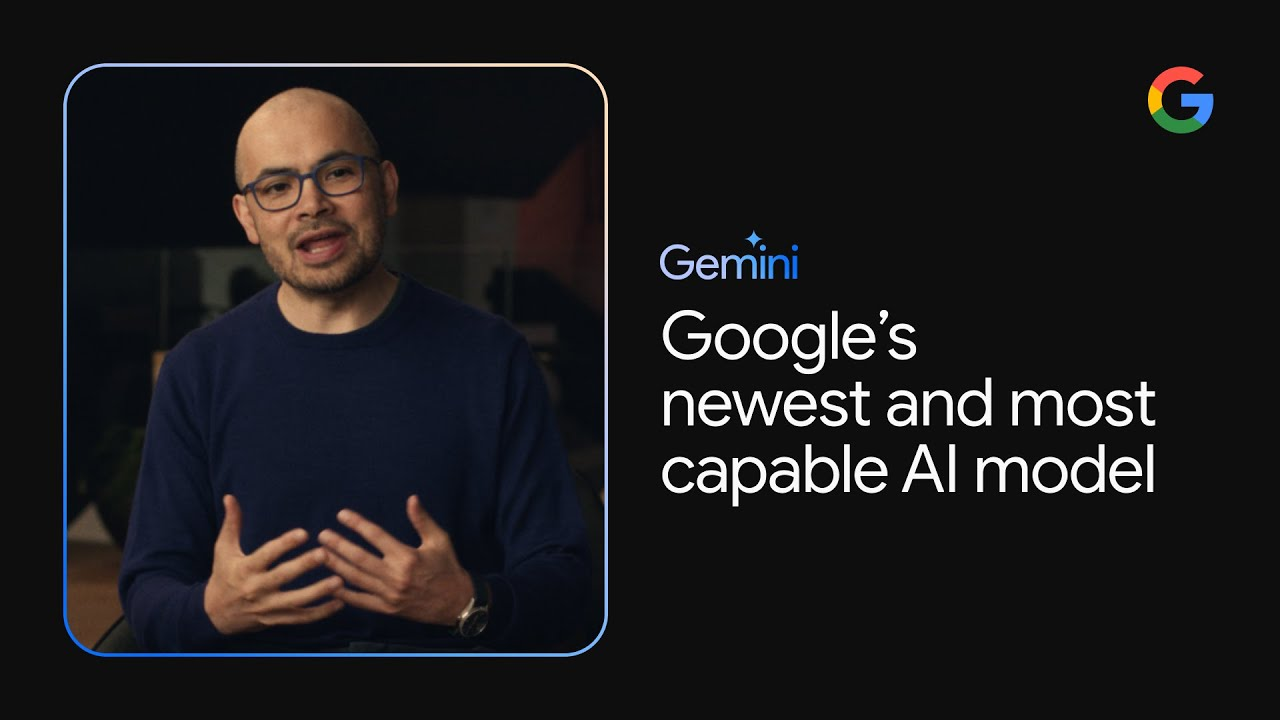
Google's plan is to offer a complete set of tools built around its Gemini models. This is called the Customer Engagement Suite with Google AI. Google is seen as a leader in Conversational AI.
Google's Contact Center AI (CCAI) is different. It is made to upgrade existing call center systems, not replace them. The "Brownfield" Advantage is Google's biggest strength. CCAI can sit on top of old contact center systems (like those from Cisco or Avaya). This lets large companies get the power of generative AI without a disruptive, multi-year migration.
The Conversational Insights tool uses Gemini models to check customer data in real-time. It tells managers what customers are calling about and how their team is doing. Quality AI represents a significant shift in how companies assess quality. It automatically checks every customer interaction against business and legal rules. Quality checking used to be manual and slow. Automating 100% of quality checks gives fast feedback to human agents and greatly improves rule-following.
The system also offers Real-Time Sentiment Analysis. If the AI detects that a customer is upset, it can instruct a human agent to intervene immediately. This solves problems before they escalate and helps keep customers satisfied.
The Gemini system works well with other Google apps. The Agent Assist product coaches human agents in real-time. It suggests the "next best action," gives real-time answers from company manuals, and automatically writes summaries after a call.
Google Cloud promises strong privacy and control. It is built on Google Cloud's proven security foundation. Google promises that the customer data used for the AI is considered Customer Data.

AWS uses a strategy of vertical integration. It combines its cloud contact center (Amazon Connect) with its AI model service (Amazon Bedrock). This creates a single system that improves across every customer channel. AWS wants to remove the cost and mess of using many different tools.
AWS is focusing on voice automation because it has its own call center platform. The new Amazon Nova Sonic model inside Bedrock is a breakthrough. It lets companies build advanced, natural-sounding voice AI agents without needing separate speech parts. This is a key development for 2026. Nova Sonic creates human-like conversations, cuts customer wait times, and can instantly handle a massive number of calls.
Amazon Connect uses AI to help customers help themselves through phone and text. It also gives real-time agent support. The Agent AI Ally tool, powered by Amazon Bedrock (which can use models like Anthropic Claude), gives human agents instant facts and suggests follow-up questions. This makes agents faster and more accurate. For large companies with many old documents and files, Amazon Q Business acts like a smart chatbot. It connects to company systems to find information instantly.
AWS Bedrock's security is very strict. It promises it never stores or uses customer data to train its models. This strict data isolation is a huge plus in regulated industries. Bedrock meets many top security standards like HIPAA, GDPR, and FedRAMP.
AWS offers great strategic flexibility. Bedrock is a "marketplace of FMs," offering its own Titan models, plus others like Anthropic Claude and Mistral. This lets CTOs change the core AI model easily within the same secure AWS system if a competitor's model gets much better.
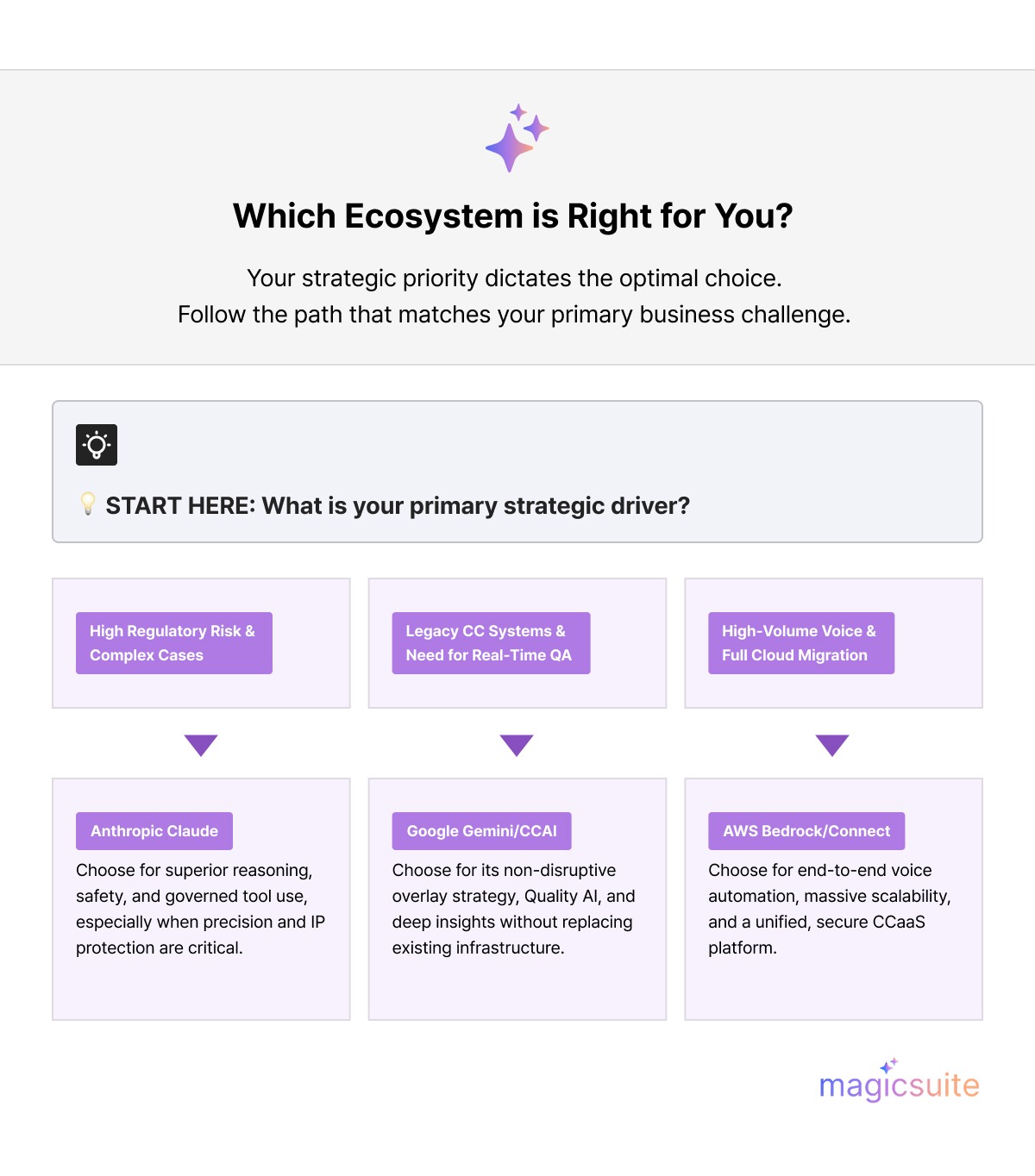
The AI race is no longer about the best model score. It is about which ecosystem allows for the fastest, most secure, and scalable deployment. Anthropic offers a great model "brain," while Google and AWS offer full "nervous systems" for company use.
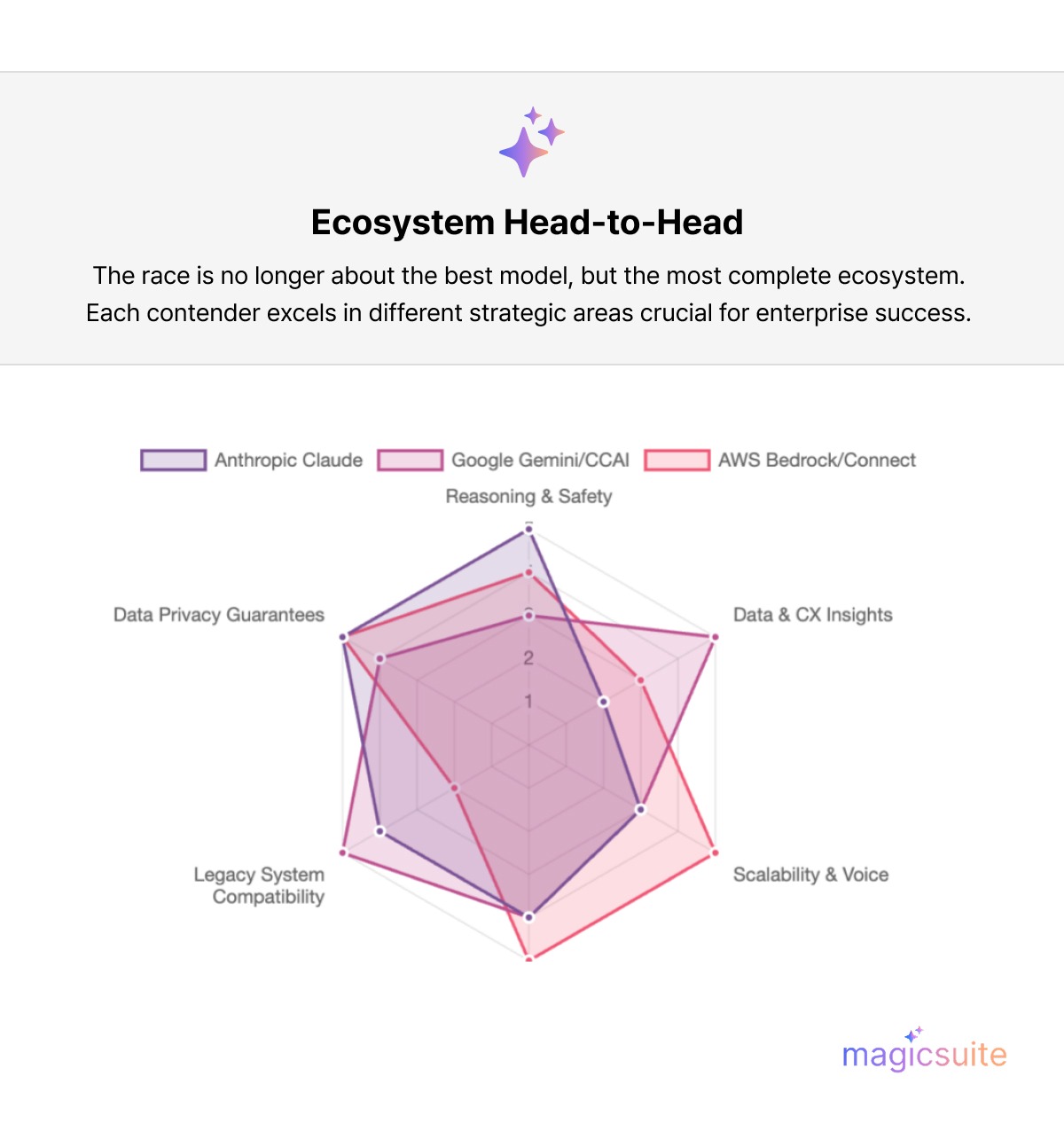
Your choice should depend on your company's main goal and current systems:
Choose Anthropic Claude if:
Choose Google Gemini / CCAI (Contact Center AI) of:
Choose AWS Bedrock / Connect if:
The key decision is not finding the "best model." It is choosing the platform that best fits your company's risk profile, its current technology, and its strategic need—be it safety, data insight, or a full cloud change.
Follow MagicSuite to learn the latest trends, strategies, and competitive intelligence shaping the future of AI customer service.

Hanna is an industry trend analyst dedicated to tracking the latest advancements and shifts in the market. With a strong background in research and forecasting, she identifies key patterns and emerging opportunities that drive business growth. Hanna’s work helps organizations stay ahead of the curve by providing data-driven insights into evolving industry landscapes.